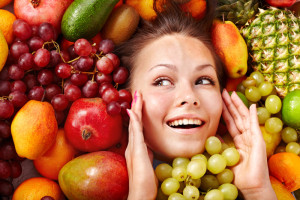
I consider the most important measure for skin health to be nutrition. Since the skin is in a constant state of renewal it needs powerful nutrients to speed up the regeneration process, that is, cell renewal. It also needs the phytochemicals in certain foods to slow down free radical damage, to help protect from sun damage, and to ward off inflammation. No one food is a magic bullet, but all the foods on my list will contribute something to the maintenance of good skin.
Yogurt – Well, maybe this food is a magic bullet. Get the plain low fat yogurt with the National Yogurt Association (NYA) seal on it. This means that this yogurt has “live and active cultures.” Avoid the yogurts whose labels say “made with Active Cultures.” These yogurts are probably heat-treated after fermentation. If this is the case, all the good bacteria are dead. Get Gary B. Huffnagle’s The Probiotics Revolution at the library to find out why this real food is good for the skin, hair, and general health.
 Olive Oil – Extra virgin olive oil is high in monounsaturated fat. It’s also a source of vitamin E and beta-carotene, nutrients essential for healthy skin. Dr. Andrew Weil says, “The monounsaturated fat in olive oil appears to be protective against heart disease, some cancers, and other chronic diseases while saturated fats such as butter and other animal fats and polyunsaturated vegetable oils are associated with increased health risks.” These are added benefits. Dr. Weil also says that not all extra virgin olive oils are created equal. The cheap ones, even though “virgin olive oil” is on the label, might not be the real thing
Olive Oil – Extra virgin olive oil is high in monounsaturated fat. It’s also a source of vitamin E and beta-carotene, nutrients essential for healthy skin. Dr. Andrew Weil says, “The monounsaturated fat in olive oil appears to be protective against heart disease, some cancers, and other chronic diseases while saturated fats such as butter and other animal fats and polyunsaturated vegetable oils are associated with increased health risks.” These are added benefits. Dr. Weil also says that not all extra virgin olive oils are created equal. The cheap ones, even though “virgin olive oil” is on the label, might not be the real thing
Green Tea – The phytochemicals in tea, called polyphenols, are good for hair as well as for skin. They offer some protection against the inflammation one gets from prolonged exposure to the sun. The rays of the sun can activate a type of enzyme that degrades collagen and elastin, molecules that give a youthful appearance to the skin. These polyphenols with their antioxidant and anti-inflammatory properties protect the skin from many environmental abuses.
Walnuts – I put them in oatmeal in the morning. I sometimes add blueberries to the mix also. Walnuts have high concentrations of the omega-3 fatty acids, linoleic acid and linolenic acid (ALA). These two nutrients keep the skin soft and smooth. Walnuts are also rich in trace minerals that are beneficial to the skin.
Sweet Potatoes – The canned potatoes are probably just as nutritious as the fresh ones, but the baked fresh ones taste great with some olive oil on them. Sweet potatoes are a good source of vitamin C and E, but they are a powerful source of beta-carotene. Beta-carotene is converted into vitamin A when it is digested. Only the amount of vitamin A that the body needs will be made, though, so you cannot get an overdose. (You have to be careful about getting an overdose of vitamin A in supplements. This can cause hair loss.) An adequate amount of vitamin A is important for healthy skin because it fights against the free radicals that cause wrinkles. Without adequate vitamin A in the diet the skin often looks dry.
Tomatoes – Lycopene is another phytochemical that may help reduce the damage from sun exposure. Perhaps it does this by neutralizing free radicals. Canned tomatoes and many tomato products are rich in this nutrient. (It’s hard to absorb lycopene from fresh tomatoes.) Other fruits and vegetables like watermelon and grapefruit also contain lycopene but not as much as tomatoes.
Fish Oil Capsules – Other omega-3 fatty acids are EPA and DHA. These inflammation fighters found in tuna, salmon, and mackerel are good for the complexion, but one hears so many warnings about mercury in fish that it’s probably a good idea to get these nutrients from fish oil or fish oil capsules. And it’s best to buy these supplements from a reputable company who has been in business for more than a few years. I think Vitamin World is such a company. And, by the way, cod liver oil is an excellent source of vitamin D, a nutrient that works with calcium to maintain strong bones and teeth.
Broccoli – This vegetable is a nutrition powerhouse, full of beta-carotene and an excellent source of fiber. It is also full of vitamins B1 and C, and has substantial amounts of calcium, sulfur, and potassium. Almost half the calories in broccoli are protein, molecules necessary for building all cells of the body including skin cells. Aside from its skin-enhancing properties, there is a substance in broccoli called inderol-3 that emulsifies estrogen, reducing the risk of breast cancer in women.
Cucumber – A fruit of the vine of the gourd family, this cool vegetable contains 40% potassium, 10% sodium, 7% calcium, 20% phosphorus and 7% choline. It is an excellent source of silicon. These vitamins and minerals contribute to skin and well as hair health.
Vitamin E – This vitamin with strong antioxidant properties does many positive things for the skin – lessens sun damage, helps maintain the skin’s barrier function – but it’s hard to get enough of this nutrient from the foods we eat. So supplementing is beneficial.
 Notes – The vitamins and phytochemicals in this group of foods and supplements work synergistically with each other – that is, the total effect is greater than the sum of the individual nutrients. This is one of the reasons why you should include many of the foods listed above in your skin-healthy diet. There is no one “marvelous” food that gives you all the nutrients you need for healthy skin.
Notes – The vitamins and phytochemicals in this group of foods and supplements work synergistically with each other – that is, the total effect is greater than the sum of the individual nutrients. This is one of the reasons why you should include many of the foods listed above in your skin-healthy diet. There is no one “marvelous” food that gives you all the nutrients you need for healthy skin.
Those people who have studied nutrition will notice that none of the foods I listed are good sources of iron. Women, especially premenopausal women, need about 18 milligrams of iron each day. Men need about 10 milligrams. Lean meat is the best source of absorbable iron. Women who do not get sufficient iron often experience a form of diffuse hair loss called telogen effluvium. A woman can have the most radiant skin on the planet but if her hair is getting thin, she won’t like her image in the mirror.

